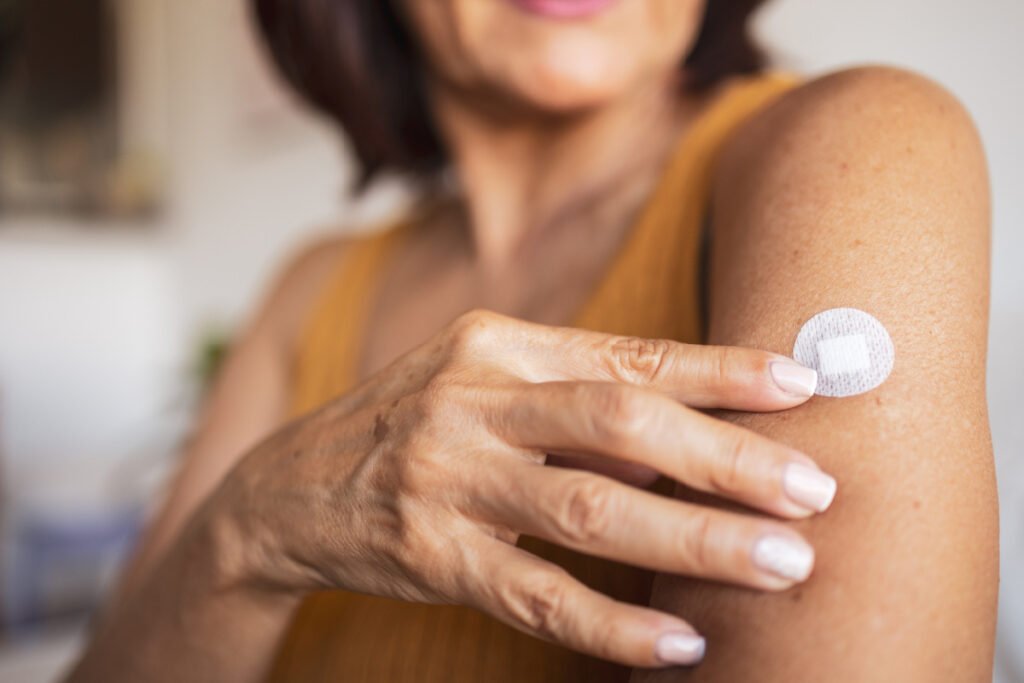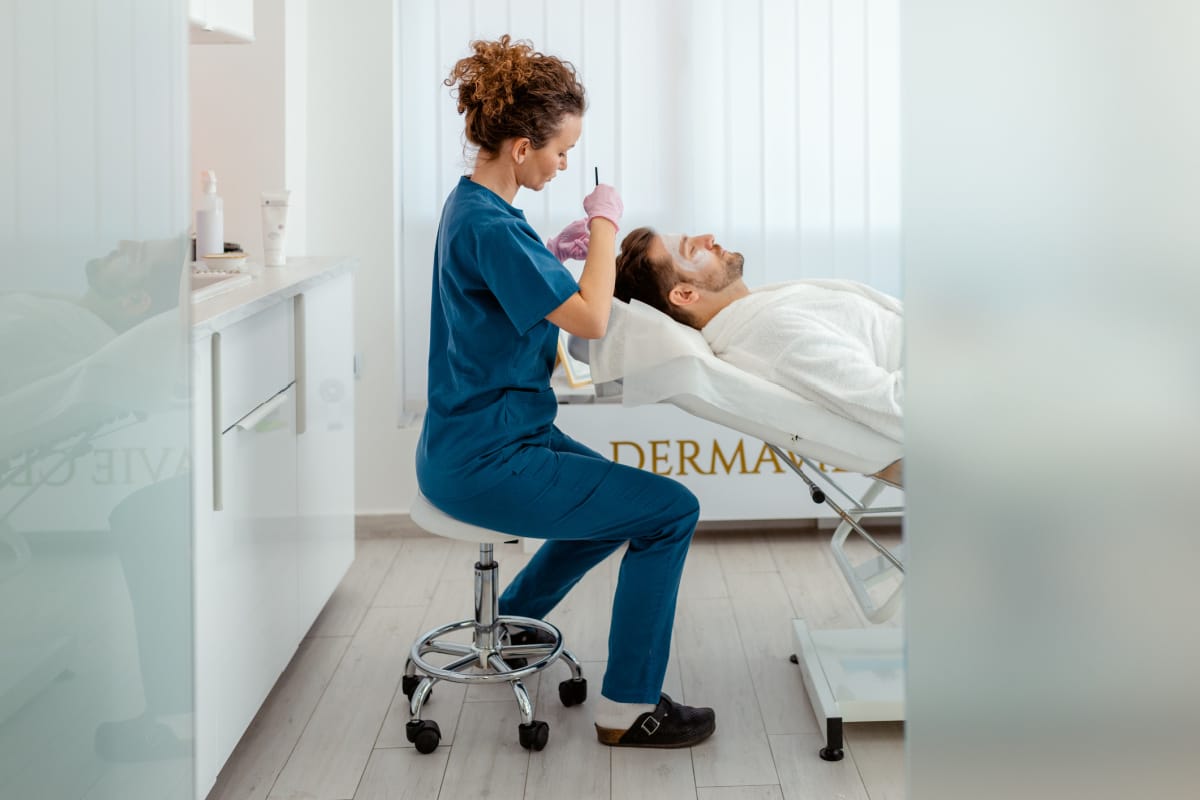Bioidentical hormone replacement therapy (BHRT) helps restore hormonal imbalances in men and women. As we age, or experience hormonal shifts after life events, our bodies’ natural hormone production fluctuates and often decreases, leading to bothersome health challenges such as fatigue, weight gain, hot flashes, poor sleep, low libido, and joint pain, just to name a few!

If you’ve had your hormone levels checked before and were told they were “within a normal range” and sent on your way, we hear you and have been specially trained to optimize hormone levels per the individual.
At our Asheville medical spa, we offer BHRT by EVEXIAS™ Health Solutions to manage these changes and bring balance to your body.
What is Bioidentical Hormone Replacement Therapy?
Bioidentical hormone replacement therapy (BHRT) uses hormones that are molecularly identical to those found in the human body. These hormones are derived from natural sources and meticulously crafted to match human hormones perfectly, which allows them to be as effective as naturally occurring hormones.
In contrast, synthetic hormones typically originate from animals and are compounded with chemical substances. Synthetic hormones only partially resemble human hormones, which the body may struggle to recognize and cause unsatisfactory results and negative side effects.
Types of hormones used in BHRT:
- Thyroid hormone therapy: Treats thyroid dysfunction, which can manifest as fatigue, mood swings, and other symptoms commonly mistaken for stress or aging.
- Estrogen hormone therapy: Adjusts declining estrogen typically associated with perimenopause and menopause to alleviate symptoms like hot flashes, night sweats, low libido, weight gain, and mood swings.
- Testosterone hormone therapy: Balances testosterone levels in men and women to improve attention and focus, low libido, muscle mass, and manage weight gain.
Forms of Bioidentical Hormone Replacement Therapy:
Depending on your needs, we will discuss the delivery methods available for your compound and recommend the ideal choice for you:
- Pellets: We insert a tiny pellet just below the skin’s surface
- Creams & gels: You apply the hormone cream to a specific area as directed
- Patches: You wear the patch for a certain amount of time, replacing it as recommended
- Pills: You take a tablet orally per your prescription
- Injections: We inject your compound either intramuscularly or subcutaneously

Signs BHRT might be for you
If you feel “off” and haven’t been able to pinpoint why, there’s a good chance hormonal imbalances are contributing to your issues.
Common symptoms of hormonal imbalances in women
- Hot flashes
- Night sweats
- Vaginal dryness
- Low libido
- Weight gain
- Depression
- Anxiety
- Mood swings
- Poor sleep patterns
- Low energy
- Brain fog
- Headaches
- Joint pain
Common symptoms of hormonal imbalances in men
- Weight gain
- Muscle loss
- Trouble sleeping
- Low energy
- Excess breast tissue (gynecomastia)
- Hair loss
- Depression
- Irritability
- Excessive sweating
- Brain fog
- Low sex drive
- Erectile dysfunction
- Trouble urinating
Benefits of BHRT
The benefits of BHRT include relief from the symptoms of hormonal imbalances as well as improvements in bone density, a reduced risk of osteoporosis, better cardiovascular health, and enhanced muscle function.
Many patients report improved mood, decreased symptoms of depression, and better overall emotional well-being.
Candidates for hormone replacement therapy
You may be a candidate for hormone replacement therapy if:
- You suffer from any of the symptoms above
- You are in peri-menopause, menopause, or andropause
- You have known hormonal deficiencies or are undergoing certain types of surgery (like hysterectomy)
- You have a history of bone density issues or severe menopausal symptoms
BHRT treatments at Mountain Radiance
Our Asheville hormone providers, Dr. Mark Chandler and our Physician Assistant Christina, oversee BHRT treatments. During your consultation, your provider will thoroughly assess your medical history, symptoms, and lifestyle to understand your unique case. The $100 consultation fee will be deducted from the cost of your treatment if you decide to move forward with hormone replacement therapy.
If you are a good candidate for bioidentical hormone replacement therapy, we will run comprehensive lab work to carefully assess your hormone levels to pinpoint the imbalance(s) and accurately tailor your treatment plan.
We’ll administer the ideal dose of hormones via pellet or injection in our office, or prescribe the gel, patches, or pills with easy-to-follow instructions for you to do at home.
Pellet therapy
Most patients prefer pellet therapy—it’s about the size of a grain of rice and one of the most effective hormone therapy options. Plus, the pellet mimics the body’s own slow, steady hormone release and eliminates the need to remember daily pills, creams, or patches.
Your provider will insert your pellet under your skin near the hip/upper buttock area:
- Pellets for male patients typically last between 5-7 months
- Pellets for female patients typically last between 3-4 months
This method is particularly advantageous because your body will trigger the release of the hormones to support you on a daily basis—if you are particularly stressed or if your natural hormone levels sink depending on your monthly cycle, the pellet releases corresponding hormone levels to help you feel balanced no matter what your day looks like.
BHRT pellets by EVEXIAS™ cause less discomfort and scar tissue formation compared to previous pellets and other brands. These pellets are designed to integrate more smoothly with the body’s tissue, reducing potential scar tissue buildup for a more effective and pleasant treatment process.
- Key Benefits
- Glossary
- Relief from Menopausal Symptoms: HRT is highly effective in alleviating common symptoms of menopause, such as hot flashes, night sweats, vaginal dryness, and mood swings.
- Improved Bone Health: HRT can help prevent bone density loss that occurs rapidly during menopause, reducing the risk of osteoporosis and fractures.
- Enhanced Mood and Cognitive Function: HRT has been shown to improve mood, reduce the risk of depression, and may help maintain cognitive functions, potentially lowering the risk of dementia in postmenopausal women.
- Better Skin Health: Estrogen in HRT helps increase collagen production and maintain skin moisture, which can improve skin elasticity and reduce the appearance of wrinkles.
- Heart Health Benefits: Early initiation of HRT can have a protective effect against heart disease by helping to maintain artery elasticity and reduce cholesterol levels, though this benefit needs to be balanced against potential cardiovascular risks depending on individual health factors.
- Improved Sexual Function: HRT can relieve symptoms of vaginal atrophy, increasing vaginal lubrication and relieving discomfort during intercourse, thus improving overall sexual health and libido.
- Sleep Quality: By easing symptoms like night sweats and emotional fluctuations, HRT can help improve sleep quality.
- Progesterone: Progesterone is a hormone used in HRT to balance estrogen and manage symptoms like menstrual irregularities and mood swings.
- Testosterone: Testosterone is a hormone often included in HRT to boost energy, libido, and muscle strength in both men and women.
- Estrogen: Estrogen is a key hormone replaced in HRT to alleviate menopausal symptoms such as hot flashes and vaginal dryness.
- Menopause: Menopause is a life stage of hormonal change for which HRT is often prescribed to manage symptoms.
- Estriol: Estriol is a mild form of estrogen used in HRT that is effective for specific menopausal symptoms, especially urinary and vaginal issues.
- Bioidentical hormones: Bioidentical hormones are exactly the same in molecular structure as those produced by the human body, used to create a more natural form of hormone therapy.
- Bioidentical hormone therapy: Bioidentical hormone therapy is a form of HRT using bioidentical hormones to closely mimic the body’s natural hormone production.
- Menopausal symptoms: Menopausal symptoms include hot flashes, night sweats, and mood changes that can be treated effectively with HRT.
- Bioidentical hormone replacement: Bioidentical hormone replacement is the process of administering bioidentical hormones to replace those no longer adequately produced by the body.
- Hormone levels: Hormone levels are the amount of hormones present in the body, key in determining the need for and type of HRT.
- Bioidentical hormone doctors: Specialists who prescribe and manage bioidentical hormone therapy, ensuring treatments are tailored to individual needs.
- Clinical trials: Research studies that test the safety and effectiveness of HRT products before they are approved for use.
- CBHT preparations: Custom Bioidentical Hormone Therapy preparations made specifically to suit the hormonal needs of an individual.
- Synthetic hormones: Synthetic hormones are man-made hormones used in traditional HRT, different from bioidentical hormones as they are not exact matches to human hormones.
- FDA-approved products: Hormone treatments and other medical products that have been approved by the Food and Drug Administration for safety and effectiveness.
- Vasomotor symptoms: Common menopausal symptoms such as hot flashes and night sweats that are often targeted by HRT.
- Adverse event reporting: The process of documenting negative side effects from treatments like HRT to improve patient safety.
- DHEA (Dehydroepiandrosterone): DHEA is a hormone involved in producing other hormones, sometimes used in HRT to enhance overall hormone balance.
- Compounding: The process of customizing HRT formulations to meet the specific hormonal needs of an individual.
- Bioidentical progesterone: Progesterone that is identical to what the body produces, used to counterbalance estrogen in HRT.
- Natural hormone therapy: HRT that uses hormones derived from natural sources rather than synthetic compounds.
- Fibroids: Non-cancerous growths in the uterus that may respond to hormonal changes affected by HRT.
- Endogenous estrogen: Estrogen naturally produced by the body, often supplemented by HRT during menopause.
- Testosterone therapy: The use of testosterone in HRT to address symptoms like low libido and energy in men and women.
- Topical: Referring to hormones applied directly to the skin.
- Premenopausal women: Women approaching menopause who might start HRT to address early symptoms.
- Micronized progesterone: Progesterone processed into a finer form that is more easily absorbed by the body, used in HRT.
- Perimenopause: The transitional period before menopause where symptoms begin and which may be managed with HRT.
- Postmenopausal: Referring to the phase after menopause, often when HRT is used to manage long-term symptoms.
BHRT FAQs
How long does it take for hormone replacement therapy to work?
Some people may notice improvements in their symptoms within a few weeks or less, while changes in symptoms such as bone density might take several months to manifest.
Can BHRT help with weight management?
HRT is not primarily used for weight loss but it often helps manage weight indirectly. When your hormone levels are balanced, your metabolism can function better and you’ll have more energy, potentially making it easier to maintain or lose weight when combined with a healthy lifestyle. Hormone replacement therapy can also help control insulin resistance, which is a common reason why people struggle to lose weight despite diet and exercise.
Is hormone replacement therapy safe for long-term use?
Yes, bioidentical hormone replacement therapy is generally safe for long-term use because it uses hormones that are chemically identical to those the body naturally produces for a more holistic way to keep your body balanced. Our providers understand that your needs are unique and personalize your treatment plan for the safest, most effective outcome possible, no matter how long your treatment is. We also regularly check in with each patient and make changes as needed.
What are the side effects of HRT?
Side effects aren’t typically common and may include acne, weight gain, hair growth, and hair loss. In the past, there have been misguided concerns about potential risks associated with HRT like cancers, blood clots, and heart diseases, which have been dispelled by comprehensive clinical studies. Most patients respond really well to hormone replacement therapy and report only positive experiences.
If you do experience mild side effects such as nausea, breast tenderness, or mood swings, they will likely be temporary and resolve as your body adjusts to having hormonal support.
What should I do if I experience side effects from the hormones?
If side effects become bothersome, we can adjust your hormone dosage, switch the type of hormone, or change the administration method to alleviate side effects.
Can I stop HRT treatments suddenly?
It’s best to taper off HRT rather than stopping suddenly to avoid potential withdrawal symptoms such as the return of menopausal symptoms or mood fluctuations. Your provider will recommend the least disruptive regimen to end your treatment.
Can hormone replacement therapy affect my sexual function?
HRT can often improve sexual function, especially in those who have symptoms like vaginal dryness or a decrease in libido due to low hormone levels. Balanced hormone levels can enhance sexual desire and make intimacy more comfortable.
If you are suffering with any of these symptoms we listed and would like to know if hormone replacement therapy can benefit you, our team is ready to answer your questions and guide you through the process of achieving hormonal wellness. Schedule your consultation with Dr. Mark Chandler or Physician Assistant Christina by calling (828) 627-2711 or book your appointment online using the button at the bottom of this page.
References »
Hodis HN, Mack WJ. Menopausal Hormone Replacement Therapy and Reduction of All-Cause Mortality and Cardiovascular Disease: It Is About Time and Timing. The Cancer Journal. 2022 May-Jun 01;28(3):208-223. doi: 10.1097/PPO.0000000000000591.
Harper-Harrison G, Shanahan MM. Hormone Replacement Therapy. [Updated 2023 Feb 20]. In: StatPearls. Treasure Island (FL): StatPearls Publishing; 2024 Jan-.
Lundberg G, Wu P, Wenger N. Menopausal Hormone Therapy: a Comprehensive Review. Current Atherosclerosis Reports. 2020 Jun 18;22(8):33. doi: 10.1007/s11883-020-00854-8.
Salpeter SR, Walsh JM, Ormiston TM, Greyber E, Buckley NS, Salpeter EE. Meta-analysis: effect of hormone-replacement therapy on components of the metabolic syndrome in postmenopausal women. Diabetes, Obesity and Metabolism. 2006 Sep;8(5):538-54. doi: 10.1111/j.1463-1326.2005.00545.x.
Biscup P. Risks and benefits of long-term hormone replacement therapy. American Journal of Health-System Pharmacy. 2003 Jul 15;60(14):1419-25. doi: 10.1093/ajhp/60.14.1419.



